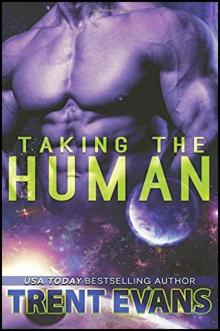- Home
- Trent Evans
Submission's Edge Page 2
Submission's Edge Read online
Page 2
But something compelled him to stay out here anyway.
Was he hiding from her? Why? Diandra was the most loving, sweet wife a man could ask for, but there was no doubt that now there existed a… tension. Strained was how he’d describe it, even if neither one of them had ever spoken a single word about it.
Or was he hiding from himself, from his real needs? What he truly wanted.
As he walked from the repair bay toward the crew module, he couldn’t help but question his motives — and hers. Why was he here? The station was almost completely automated. Out here, he was still a glorified maintenance tech. He was multi-skilled, yes, but a trained monkey could do what he did. Yet here he was, again.
“Has the star packet come in?” he asked as he walked, the sound of his footfalls echoing in the bare brightly-lit corridor.
“Twenty-one minutes, sir. Something you’re looking for?”
“No, nothing. I… yeah, forget it.”
It was almost over, the “Black 24.” It was a term the crewmembers had coined for the delays between star packets and any communication that came with them. Out there on the periphery, they were only transmitted once every twenty-four hours. They called it the “Black 24” because if something went wrong — anything — you were on your own for at least twenty-four hours.
No information got in. No information got out.
He stepped into the crew module, taking a deep breath, dropping to his chair, checking his finger again. It was already bruising, but he got lucky. Just a small area was cut below the second knuckle. He pressed the cloth to the cut once more, and thought of her again. He loved his wife dearly, but even he couldn’t answer why he spent so much time away from her.
He looked up, calling out for the computer again. He called it the Eye in the Sky. It was an old joke making reference to an ancient song back on Earth. Joking aside it was an eternally relevant fear, the all-watching, all-knowing surveillance state.
Out here, it wasn’t a state — it was a central computer.
“Eye, has Dylan 24A come back online?” It was the nearest station, 0.4 lightyears away. Its locator beacon had ceased transmitting four days ago — probably malfunctioning — but it was unusual to have a locator beacon be out for that length of time.
“Negative, sir. No trace of the beacon.”
“Let me know when it comes back on, will ya?”
“Of course, sir,” the computer said.
It wasn’t the fact that the Dylan systems beacon went offline; it was the fact that there was a recent development of several of them going offline — and staying that way. One of them apparently had its local star packet relay node — which wasn’t anywhere near the station itself — go dark too. Which meant it had either malfunctioned, or been destroyed. He hoped it wasn’t the latter.
He wondered if the men crewing those stations failed a verification inquiry. It was a possibility — though such a thing wouldn’t explain the star packet node going dark.
The “verification inquiry” was a diagnostic, spontaneous mental fitness test conducted at the central computer’s whim, presumably when the computer sensed certain behavioral warning signs in a crew member. He’d never actually heard of one resulting in the crew being replaced, but he knew it had been done in the past.
It was always a concern. Being replaced as a crew member meant you forfeited your wages — and you might never get another assignment again.
For Martin though, he wasn’t sure if being sent home would be a disaster — or salvation.
* * *
Martin reclined in the grav chair, not yet knowing that in a few short minutes his old life was about to end.
Situated at the center of the pilot house, the grav chair allowed him a panoramic view of the vast asteroid field spread out below him. He always found the term “pilot house” odd considering the fact the station had no engines, no way to steer.
The station’s hull was little more than a huge pod that could be dragged behind a tug. But still, it had a pilot house, though most of the time spent in there was simply watching local traffic, star lanes lighting up now and then as a freighter — most of them automated — transited the nearest gate.
Charon 90 they called the station, but for Martin, it might as well have been called Purgatory. Situated at the very edge of galactic space, it was the quintessence of remote, a distance from the galactic core so immense, he often felt as if he were marooned in deep space itself.
The hum of the projection unit changed timbre, three clicks heralding another burst of star packet traffic. Though he’d seen it countless times, it still amazed him to watch the color wash across the curved ceiling above him. The pilot house itself essentially a sphere, a representation of nearby space — Charon 90’s sector — projected upon the inner surface of it, much like a planetarium might project images of Earth’s night sky. Only in this case, it was everything within one lightyear of the station.
It was day thirty-six of his contract.
Only 124 days to go.
He tapped a companion screen next to him, bringing up the station’s system display; life support, fuel supply, cargo capacity. It was all automated. He checked it anyway.
It was training. It was rote. It kept him sane. It was something to do.
He clicked over to the viewport to take in the surface of the main asteroid. It was large — larger even than Ceres back in the Sol System. As big as a small planet, its surface was a ruddy, chocolate color, pockmarked with dramatic impact craters.
“Shuttle Three returning,” the Eye in the Sky said, her dulcet smooth tones ones that he often heard in his sleep.
“Computer,” he said. “Patch in Shuttle Three’s exhaust cowl camera.”
“Of course,” Eye in the Sky said.
Instantly, the image was projected above him, Shuttle 3’s main engines executing the escape sequence from the asteroid’s relatively weak gravity well.
He wasn’t even sure why he looked at it, but each time he did, he grew more and more wistful, thinking again of the day when it would be he on an escape sequence, headed toward the local system gate — and home.
To her.
He tried not to think of his wife too much. Diandra warned him every time before he went off on another contract that thinking of her would only make his time pass slower. He always thought it was an odd thing for her to say, but he knew she said it to comfort him.
And she was right. Not thinking of his gorgeous wife’s long blonde hair, her pale turquoise eyes, those soft pink lips that seemed to glisten no matter whether she’d painted them or not. He found if he stopped thinking of her, her image haunted him less and less. He found if he thought of her less, being reunited with her at the end of the contract made it that much sweeter, their love renewed, their lust reignited, their bond deepening.
But he’d seen it the last time he’d said goodbye to her. He’d seen the strain. He’d seen the doubt. He’d seen the sorrow.
It was new, and it was bad. And there was nothing he could do about it.
He slung his legs out of the gravity chair, allowing himself to acclimate for a moment sitting upright. He’d sometimes spend hours in that position, reclined, staring up at the lanes all around him, knowing the nearest other human being could be a parsec a way. Or farther.
The station, courtesy of its immensely powerful central computer, what crew members on Charon 90 dubbed “Eye in the Sky,” was essentially fully automated, the mining, the power generation, all controlled and running by itself. Truth be told, he wasn’t even sure how the mining on Charon 90’s several asteroids was done, though he knew that it was chiefly retrieving Helium-3 and Arctenium, the fuel that helped run the Milky Way’s entire gate system.
He let his toes touch the cold floor of the pilot house. He rarely wore shoes inside the station anymore, finding the subtle hum and vibration from the station’s main powerplant to be oddly comforting, almost pleasurable, against the soles of his bare feet. He headed for the exi
t, taking one last look at the colors, the visual representation of all of the burst of star packet traffic being retrieved by freighters, other stations, medical outposts, and supply platforms, all around the local group. Those bursts of traffic were rare and sporadic, never more than ten or eleven days in frequency, sometimes as long as a month.
And unlike every other contract he’d ever done, Martin found to his dismay that the receiving relay for Charon 90 picked up... nothing for him. Every contract he’d been on, Diandra had messaged him as soon as physically possible.
This time, she hadn’t.
In over thirty-six days.
It was clear what it meant. The slow slide to alienation, to estrangement, had already begun. He was one of the few station jocks who actually had managed to maintain a marriage. Most of the others were either single and never able to actually establish a relationship, or sadly, poor souls whose bonds with their loved ones couldn’t survive the gulf of ten thousand lightyears separating home and their workplace on the shitty little station.
He made for the door, mentally walking through his maintenance checks, ones he knew were not needed, ones he knew were simply in place to keep his mind occupied, to keep him from thinking about how alone he actually was in this place.
The sharp warning tone, followed by three clicks, stopped him in his tracks.
“Sir, transport approaching.”
There hadn’t been a single transport sent to the station during any contract he’d been on — and he’d been on many. He turned around, though he didn’t need to. Looking at the projection above him, he spoke the words. “Eye, repeat that.”
Her smooth tones obeyed. “Transport inbound from local gate. ETA: thirty-one minutes. Shall I hail it, sir?”
“No,” Martin said. “I’ll see them myself.”
Chapter 2
Martin’s quick footsteps echoed up and down the cavernous central corridor. The station itself was shaped essentially like a long cylinder. On one end, the command module, which included Martin’s quarters, the pilot house, and the communications array, while the other end consisted of the storage bays and the docking platform. In the middle, extending out into a truly massive machinery space was the mining plant itself.
Charon 90 was one of the newer stations that actually had an integrated first-phase processing capability. The company had long ago decided that gate transit fees being what they were, it made much more sense to make sure the cargo — the cost of which was assessed by mass — was as pure as possible. Consequently, new stations were developed — Charon 90 being one of them — that burned away all the bulk slag that was an inevitable part of ore extraction, leaving only the lucrative fuel, the precious materials.
In this case, Helium 3 and Arctenium.
As he moved down the corridor, lights flickered on and off as he passed by, the ones behind him fading, then winking out entirely, the ones ahead doing the opposite. As he passed by the main hatch to his left to the mining module, he could feel the heat from the plant, the roar of the machinery, the vibration so strong that it shook the floor as he passed by.
He still couldn’t figure out why the transport was inbound. Transports never showed up unexpectedly. The only time they had – to his knowledge – was when the Eye in the Sky had deemed a crew member to be unfit for service. At least, that was the only time he’d ever heard of such a thing happening.
But that obviously wasn’t the case here. Was it?
What the fuck is going on?
The hatch to the docking module in sight, he raised his voice. “Computer, origin data for inbound transport.”
The Eye paused for a split second. “This is an unscheduled transport, sir. Would you like me to hail it?”
“Negative,” Martin growled.
It at least confirmed something — he wasn’t being replaced. Company regulations stated that The Eye in the Sky would be required to state that a replacement crew member was aboard the transport in the event of “unscheduled rotation,” the corporatese term for a crew member losing his marbles.
That answered one question, but he still didn’t know why the transport was en route.
He swung the hatch open, letting it close behind him with a clank. The air in the docking module was always colder, stale. He didn’t like it, especially knowing less than half an inch of steel separated him from the cold, deadly vacuum of space.
He fired up the docking motors, the control screen flickering to life with a tiny whine as he ran through the start-up protocol for an arriving transport. This could also be fully automated, but when it came to something like this — and docking was never without some risk — he always went through the list himself.
One could never be too careful.
Emergency atmosphere. Check.
Docking umbilicus active. Check.
The motor hummed loudly, one of the floor plates rattling at the vibration as he used the manual controller to first fully extend, then retract the umbilicus back into its housing.
Umbilicus armature test. Check.
Airlock closed and locked. Check.
Back-up atmosphere retention shield primed. Check.
The start-up protocol flashed an optional unscheduled transport icon, and under that there was one item on that list.
Sidearm, locked and loaded.
He ignored that, canceling it and shaking his head as he did so. Charon 90 was literally on the other side of the Milky Way from Earth — about as far away from anything that mattered as you could be. There was no way there was any danger. Not out here.
The biggest danger on Charon 90 was the lack of… anything happening at all.
He flipped the controls back to full auto, satisfied all was in working order, and watched the telemetry from the docking module’s control panel. The station’s powerful auto-nav locked on at 500 kilometers, initiating the main braking sequence, and taking over control of the transport just as he would expect.
“ETA, three minutes,” Eye in the Sky intoned, the transport’s speed rapidly decreasing.
Thus far, there was nothing out of the ordinary.
Still, it didn’t keep his heart from beating just a little bit faster as the umbilicus extended, two thunks and a metal on metal screech heralding a successful docking connection. Then a loud hum as the umbilicus’s motor used that connection to draw the transport that last few meters into the docking bay itself.
He wished he had visibility inside the bay, but the camera had quit working three days after he’d begun his contract, a replacement not expected to arrive until the next scheduled rotation.
To his left, the airlock hatch for the bay began charging, two banks of yellow lights — to the left and right of the airlock — flicking on, illuminating the space immediately in front of the hatch. He flipped the safety cover for the emergency purge. He’d never had to use one, but he’d seen video of an emergency purge being tested. Anything standing within three meters of an airlock opening would be flushed out, like the week’s refuse, in less than half a second.
All he had to do was push the button.
The airlock hissed, the air pressure in the module changing, Martin opening his mouth to relieve the pressure in his ears. With a bone-rattling clank, the main airlock opened, the slightly acrid scent of artificial atmosphere flooding over his face as the pressure within the transport and the station momentarily equalized.
Then someone stepped through the doorway.
Oh, my dear Lord.
Martin flicked the safety cover back over the purge button, his heart pounding rapidly now. The person standing before him in front of the airlock wasn’t a replacement crew member.
It wasn’t a pirate. It wasn’t a military officer.
It was Diandra.
Chapter 3
For a long moment, he wasn’t sure what to say.
He wondered if he was dreaming. But it was her. Her hair was shorter, straighter, maybe not quite as long, maybe not quite as dark as the last time he’d seen he
r, but it had been long enough now that he wasn’t sure his memory of what Diandra actually looked like could be relied upon anymore.
She was wearing a jumpsuit similar to what transport pilots would be expected to wear, except this one was all white, featureless, the only hint of something vaguely military being the squared-off shoulders. It was zipped up to the hollows of her throat, her long slender neck highlighted well.
“Diandra? How? Is it really you?”
She smiled, then shockingly, shook her head. “I’m not Diandra. I don’t really have a name. But I’ve been sent by your wife. She wanted me to travel to you. I’m a gift.”
“You’re a gift? I... don’t understand. You look just like my wife.”
The woman smiled again. “I’m an artificial person. I could give you my model number, but I doubt that would mean much to you. I’ve been instructed to look — to be an exact replica of — your wife. That’s a part of the gift.”
“Here.” She reached into a pocket of her jumpsuit, a jumpsuit that was quite snug around the curves of her body.
The curves that reminded him exactly of Diandra.
She pulled out a small, flat disc, perhaps four inches in diameter, and then held it upon her open palm. A hologram, shimmering white-blue, appeared above the disc.
It was Diandra.
“Sweetie, they said I can’t be too long with this message, so I’m going to be short and to the point. I miss you terribly. I miss you every day, so I wanted to send this to you as a gift. Since I can’t be there in person, I can be there with you in spirit… and maybe a little bit more. I sent her to you to provide you companionship, and service... and pleasure.”
He took a step back at the word, but the hologram continued.
“Her orders are to obey anything you tell her. Anything, Martin. I mean it. Treat her as if she were me — or how you’d like to treat me, if I were there by your side. I love you.”

 Submission's Edge
Submission's Edge Taking the Human
Taking the Human Quinton's Crucible
Quinton's Crucible Her Troika (The Complete Story) (Dominion Trust Book 2)
Her Troika (The Complete Story) (Dominion Trust Book 2) A Message of Love
A Message of Love The Yielding of Rose (Terran Captives Book 2)
The Yielding of Rose (Terran Captives Book 2) Valley of Surrender Series - Vol.1
Valley of Surrender Series - Vol.1 Expecting Surrender (Dominion Trust Book 3)
Expecting Surrender (Dominion Trust Book 3) Becoming Theirs (Dominion Trust Book 1)
Becoming Theirs (Dominion Trust Book 1)